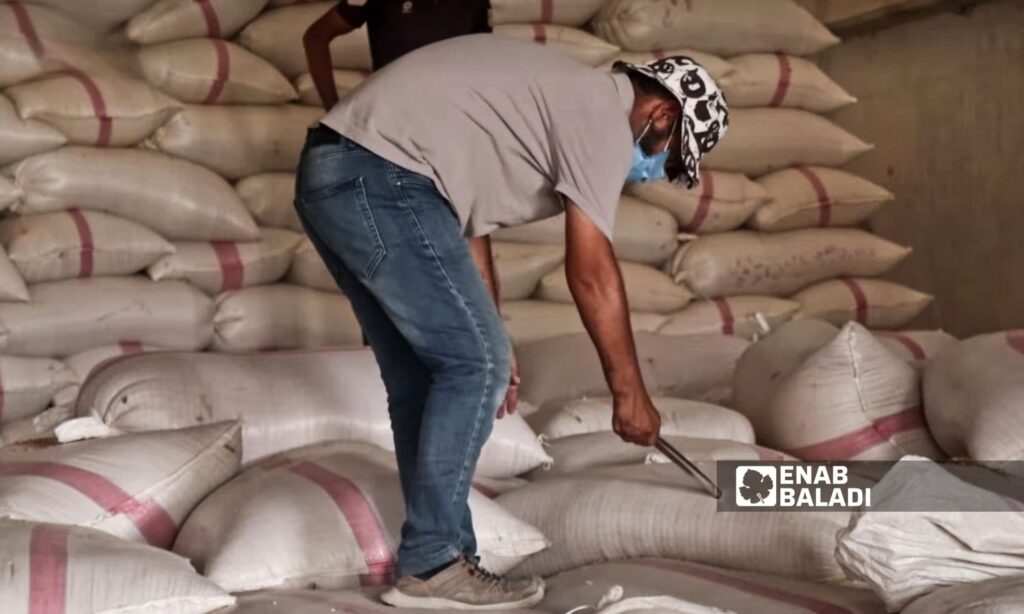Enab Baladi – Ras al-Ain
Anger and resentment have returned among farmers in the city of Ras al-Ain, northwest of al-Hasakah, after the Syrian Interim Government (SIG) set the purchase price for hard wheat from farmers, pushing traders to also lower their purchase prices.
After delaying the price issuance for hard wheat, the Interim Government set the price of the first-grade hard wheat at the end of last July at $245 per ton, the second-grade at $240 per ton, and the third-grade at $235 per ton, while the price of the fourth-grade is determined according to the percentage of impurities and foreign matter.
Farmers considered the prices to be unjust, unfair, and below the actual costs of production, which includes seeds, fertilizers, irrigation, and labor, in a region heavily reliant on agriculture and a season anticipated by farmers to meet their needs.
Does not cover farming costs
Omar Hammoud, head of the agriculture office in the local council of Ras al-Ain, told Enab Baladi that the fixed prices do not align with the high costs (fertilizers, medicines, labor, fuel, and solar power systems) that farmers incurred for the wheat crop this year.
He clarifies that the production has significantly decreased this year, where in most of the lands it did not exceed 150 to 200 kilograms per dunum, while in previous years the production was no less than 350 kilograms per dunum.
He added that the area planted with hard wheat this year reached 69,000 dunums, while the area planted with soft wheat was 40,000 dunums.
Hammoud called for reconsidering the new pricing, as the price for hard wheat was $330 per ton in 2023, but this year it is only $245.
Traders reduce purchase prices
Before the Interim Government pricing was issued, a ton of hard wheat was sold at the farm at a price ranging between $230 and $235, without any additional costs of transportation or fees or waiting.
The payment was made directly to the farmer by the trader, but after the government pricing was released, prices dropped to $190 per ton for the first-grade, negatively impacting the buying and selling activity.
Farmer Ahmed al-Qatie from the city of Ras al-Ain expressed his dissatisfaction with the Interim Government pricing, saying that farmers bear significant expenses including seeds, fertilizers, irrigation, and labor, which have become very expensive.
He told Enab Baladi that the new price is much lower than the costs, causing losses for farmers, and the sales revenue will not be sufficient to cover the expenses.
On the other hand, Youssef al-Hassan, a farmer from the village of al-Malha west of Ras al-Ain, said that the wheat used to be sold from the farmer’s field to the traders at a suitable price, without additional costs like transportation or fees, and the payment was made directly by the trader, which simplified the process for farmers.
He told Enab Baladi that this pricing has negatively affected the buying and selling activity, as traders stopped buying wheat at the old prices.
The farmer pointed out the urgent need to reconsider the pricing or cancel it or even stop receiving wheat by the Interim Government, to ensure fairness in the market and the continuity of sustainable agricultural production.
As for farmer Khaled Faisal, he considered that the Interim Government is dealing with the farmers as a trader or even worse, saying that traders bought the hard wheat before the pricing of the Interim Government at the same price, which the government describes as “encouraging.”
The price of soft wheat was also not satisfactory for the farmers, as the Interim Government set the price of a ton of first-grade soft wheat at $220 last June, the second-grade at $215 per ton, and the third-grade at $210, without setting the price for hard wheat.
It added bonuses of five dollars per ton in Tal Abyad and Ras al-Ain, which is the lowest price for wheat purchase among the four controlled areas in Syria.
Agriculture and livestock farming are among the main professions practiced by the majority of the inhabitants of the Ras al-Ain area, forming a primary source of income for the residents.
Agricultural crops in Ras al-Ain face marketing difficulties, traders’ control, and the absence of governmental entities from purchasing strategic crops in the region.

